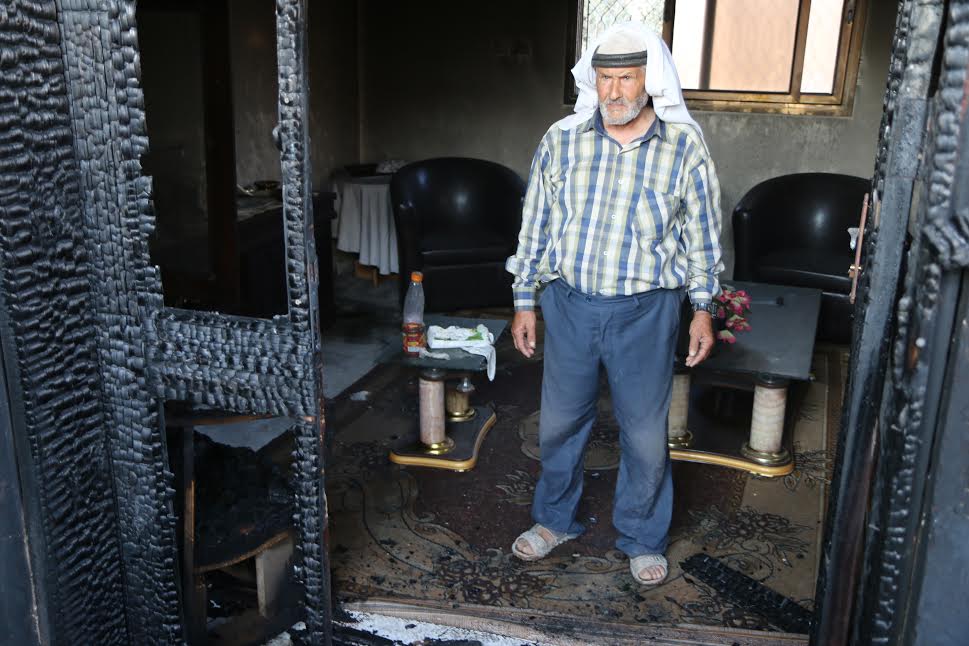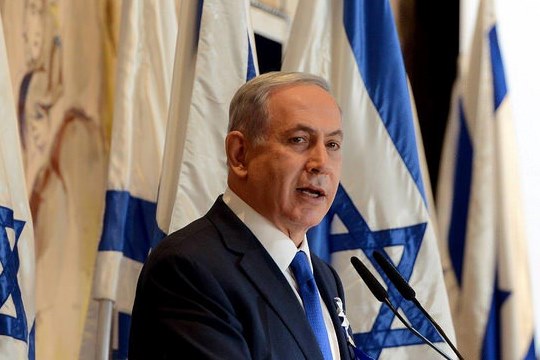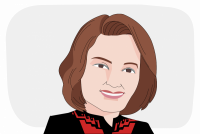The least I could do was go to the hospital to support the Dawabshe family after their 18-month-old baby was burned alive by Israeli settlers. But before I knew it I became Prime Minister Netanyahu’s Arabic translator.

On that terrible Friday morning I found myself finishing up a lecture in Tel Aviv and driving toward Tel Hashomer hospital. Following the stabbing at the Jerusalem Pride march and the burning of the family homes in Duma, I heard that two members of the Dawabsha family had been brought into Israel for medical treatment. I wanted to see how they were doing, and to be there to support the family.
I walked around the giant hospital, between the burn unit, intensive care, and the children’s hospital, until I finally asked a doctor about the family from Nablus. “Those who were burned this morning?” Yes, I said. “Come with me.” I chased after the doctor, step after step, and followed as he walked into the intensive care unit. A nurse stopped me at the entrance, “Who are you?” I am Samah, I came to see the mother from Nablus. I am a social worker and speak Arabic.
The nurse led me to bed number 7, where a medical team was treating Reham Dawabsha. How is she, I asked. “Not good. She is in very bad shape, with burns on 90 percent of her body,” the doctor told me. “We heard a relative arrived in a helicopter. Where is he? We need him to authorize information, since she is listed as anonymous and we have no information on her. Can you call him?” Yes, of course, I responded.
Two man who spoke Arabic near the coffee machine pointed me toward the children’s building. I took the elevator to the third floor, where there were fewer uniforms and more suits. A woman with a few phones in her hand stood at the entrance to the intensive care unit and stopped me. “Who are you?” I am Samah, a social worker, volunteer, human, it doesn’t matter. I am here, sent to bring the uncle who is accompanying the wounded mother. “He is here, come in.” She pointed to the small room where a young, teary eyed man sat with his head down and his face in his hands.
Hello, I am Samah, are you the doctor who came in the helicopter? “Yes, yes, you’re an Arab?” he lifted his head. I sat in that tense room with Muhammad. He was in shock, telling me how he had made it onto the helicopter with his cousin, Reham, her husband Muhammad, and their four-year-old son, Ahmad. He is a doctor in Salfit who was summoned to the scene in order to transfer the wounded to Rafidia Hospital in Nablus. He was asked to ride in the ambulance on the way to the checkpoint, and then jumped onto a military helicopter. Luckily, as a Russian speaker, he was able to ask the Russian-speaking nurse to communicate with the medical staff. Muhammad tells me what happened that last night, how the family was doing, and about little Ahmad’s wounds.
The prime minister arrives
After a short while, a senior doctor in the hospital arrived with a spokesperson. He asked how Muhammad was doing and inquired about me, and what I was doing there. I told him I came to help the family members who needed entry permits, a place to sleep, food and an Arabic-speaking liaison from the hospital. The deputy-director of the hospital said that everything would be okay. “The most important thing is that you explain to him that we will do everything for him; we will not give up, and we will bring in the best doctors in the country for the child.” I translated the words for Muhammad, before the spokesperson told me to explain to him that the prime minister was coming, and that it is important that they meet.
They left, leaving me and Muhammad to speak alone. Do you want to meet Netanyahu? “What will I do? Say no? I have no idea what to do. They burned the child and his family, what am I going to tell this Netanyahu?” Tell him how you feel, tell him the truth, I responded.

“They let the settlers do what they want and now they feel regret? Just don’t tell me that the people behind this are ‘crazy!'” he said.
Don’t worry, I told him, think about what you think is important that he understand, and say it all. As long as you feel comfortable with it. He will probably want to take a photo. “I hope he doesn’t take a photo with the child or with me, I don’t want to be photographed with him. Look, there is a photographer outside who just walked into the room.”
I got up immediately and asked the spokesperson about the photographer and what he was doing there, saying that Muhammad did not want to participate in any propaganda, or have the child photographed with any one.
‘We want one thing: justice’
Meanwhile, an Arab social worker from the hospital burst in. I recognized him immediately, we had studied together 20 years ago. I updated him and he began to take care of the family’s entry permits. He tried to obtain their ID numbers, but all of the relatives were at the funeral and there was no way to contact them.
Ra’ed, the social worker, heard that the prime minister was coming with a Russian speaker for a visit, who will speak Russian with Muhammad. Why Russian? I asked. The head doctor and the spokesperson immediately recognized the problematic situation, as did Ra’ed. All the while I continued translating for Muhammad, who said he no longer wants to speak in Russian. “Please stay here and translate for me. I don’t want to be alone, please.”
I stood there between the spokesperson, the doctor, Muhammad and a member of the Prime Minister’s Office charged with coordinating the visit, when the doctor decided: “Samah has been here for quite some time, she will translate on behalf of the hospital.”
Okay, if you have no other options, I answered meekly. I must be crazy, I thought. There is no way this is happening.
Read: How Israeli taxpayers subsidize ‘Jewish terror’
Muhammad, at this point exhausted and confused, jumped from his chair with every camera flash that went off in the packed intensive care unit. Netanyahu has arrived, I told him. The man is worried now that the settlers’ actions have been reported all around the world, and will want to show how disgusted he is by condemning it.
“You know, Ms. Samah — Sa’ad, the father, was a construction worker,” Muhammad told me, as the prime minister made his way over. “He built settlements, poor guy, and now the settlers burned him. His wife is a math teacher. She received an outstanding teacher award. What did these people do to deserve this?”
My heart stopped and I couldn’t breathe. I stopped the tears from coming and calmed myself down. Tell him everything you told me, I said, it’s important. He must know who you are, what your story is, and what you are asking. Try to think of the family, the village, about all the Palestinians.
Within seconds, Prime Minister Netanyahu was sitting in front of Muhammad, with me in the middle. I translated every word of the short conversation like a robot. I gave the order to close the door and forbade taking photos. In the beginning, Muhammad was stressed, and mostly listened. “I am sorry for your loss. We must fight terror on both sides. We will catch them and put them on trial. They harm both you and us. I called Abu Mazen, we will work together to fight terrorism.”
And then Muhammad spoke: “You know I am a Muslim and you are Jewish. In Islam we have the Prophet Muhammad, and you have Moses, and the Christians have Jesus. Every one has his own religious book. In Islam we must believe in Moses before our own prophet. In Islam we do not murder innocents, children, women or the elderly. Only those who attack you. Even a tree cannot be uprooted. That is our Islam. There is nothing in the Quran or the Torah that allows the burning of an entire family in their sleep.”

“We will take care of the child until he heals, we will re-build the homes as they were, and I will personally be at the trial of these criminals,” said the prime minister. “We do not want plaster or stone. A house is built by itself, and the house will not return to what it was without the father or mother or little Ali,” Muhammad responded. “We want one thing: justice!”
The meeting came to an end. The door opened. Muhammad and Netanyahu stood facing one another. Muhammad, the brave doctor, recoiled from Netanyahu’s attempt to hug him, and moved back. They shook hands, and it was over.
Only Rivlin speaks Arabic
Let’s go see Reham, they want you there, I told Muhammad after Netanyahu and his entourage left. As we stood up and walked toward the door, the spokesperson came back. “You can’t leave, the president is arriving! Tell him it will only be a few more minutes and he will be released.”
I translated for Muhammad. You don’t have to do this, you know. “I sat with their Netanyahu, what could be worse than that?” The truth is, you are right, I said. At least now you have experience and are more focused.
We decided to get the names and information of those who requested entry permits in order to send it to the Coordination of Government Activities in the Territories (COGAT) unit. Ra’ed said that no one is there on Friday evenings, but because this is a rare case it is worth trying. Muhammad said that Sa’ad is a former security prisoner, and will likely not receive a permit. The entire world is looking at Israel now, I said, let’s try. It’s worth a shot.
The social worker told us excitedly that he heard Rivlin’s speech, and that he is on the good side. Muhammad was skeptical of crowning the president a “dove of peace.” Before long, Reuven Rivlin arrived and sat down. After a brief update by the hospital’s deputy-director on the child and their endless commitment to take care of him, the president lowered his head and signaled to Muhammad that he was listening.
Muhammad began talking about the Prophet Muhammad’s Jewish neighbor, who used to throw trash at the former every day, until one day the Jew stopped. After a few days the prophet decided to visit his Jewish neighbor, only to find him sick. The prophet tended to the Jew, leading the two to become good friends. “This is our religion, and this is how neighbors should act,” said the doctor, a resident of Duma.
Rivlin tried his best to speak three languages, about good neighborly relations and our respect for human beings, until he got stuck trying to say that the sight of Ahmad fighting for his life was inhumane, and that no one can withstand such terrible pain.
“I only want the criminals to be caught and put in jail,” said Muhammad. “Don’t tell us that they are crazy like Abu Khdeir’s murderers.”
“They will sit in prison and will never be released, I promise you,” Rivlin answered.
The conversation with the president continued, and ended with a small hug and a handshake.
As Rivlin left, a representative from the United Nations came in, this time with an Arabic translator. Muhammad, who was by now an expert spokesperson, asked that the International Criminal Court handle the trial, rather than an Israeli one.
Envoy from Ramallah
We were standing around when suddenly four men walked in, two of whom were enormous. One of the large men turned to me and said in a terrifying voice, “We are here from the Palestinian Authority. Abu Mazen sent us to handle the situation and care for the family. My name is Jihad. Who are you?”
I looked up and it seemed as if his head reached the ceiling.
I am Samah, a social worker. I’ve been volunteering since the morning here, I replied. Why are you arriving just now? The whole world was already here, and then you walk in as if some heroes in an Arab film.
“We request of you an update of the situation. We have instructions to do everything that is necessary to ensure that the doctor here has everything he needs. Would you like to tell me what happened in the meetings? We need to update those in the leadership.”
The doctor, Muhammad, will update you, I said. Since you are here, I can go home, right?
“No, no, stay,” jumped Muhammad in response.
“Do you have people who can help really us really, have you brought only your words?” I asked the enormous man, who was immediately offended by my question.
“Try us, Ms. Samah,” he said.
I explained to Jihad that the hospital needs to see the birth certificates of Reham and Ahmad, who were burned in the terror attack, and that their family members who have work permits for Israel are stuck at the hospital entrance and need to be brought inside. The family had paid a driver from Jerusalem to bring them from Tel Aviv to Soroka – where the father is hospitalized – and perhaps the PA would like to help them a little, I enquired.

As the determined man left the room with a list of missions in hand, Ahmad Tibi’s assistant arrived to prepare the area for Tibi’s entrance. Tibi entered the ICU, and spoke with and consoled the relatives. For hours, I explained, we have been stuck here with “important” people who have come to visit, and we really need to get to Reham.
A group of men hurried the ICU and I felt my breathing intensify. On the way to Reham, we were joined by activists from Lod, as well as Ayman Oudeh and Dov Hanin.
Tears on the way home
An Arab nurse from Umm al-Fahm was taking care of Reham and told us that she was in critical condition. We stood in a painful silence, helpless in front of the resuscitation machines. It wasn’t clear if the mother would survive and her husband, Saad, was in a similar situation, with 95 percent of his body burned. Once everybody left I stayed with the doctor, Muhammad, and the mother.
I said my goodbyes to the family, to Dr. Muhammad, to the PA representatives and their entourage, and I drove to my parents’ house in northern Israel. As I was on the way out, someone from the PA called to tell me that he had sent the ID cards. The faxes had in fact arrived to the hospital, but it turned out they were blank, and I asked if he had used the wrong side of the paper.
“That couldn’t be,” he responded, though I asked him to check again, just in case.
He came back to me with a smile on his face and told me that the PA representatives had in fact scanned the wrong side of the birth certificates. I mused to myself about how that perfectly represents the lack of commitment and general failures of the PA. But then again, the family members who arrived at the checkpoint Friday evening were given permits, including, to their astonishment, for one of their young boys who had served time in prison. And then again, the authorities in Israel had been able to accommodate the issues because of a desire to cater to international opinion.
On the way from the hospital I spoke with Orly Noy, spilling my heart and experiences of traumas for half an hour on the phone. The next hour of driving home, I simply cried.
This article was first published in Hebrew on Local Call. Read it here.


